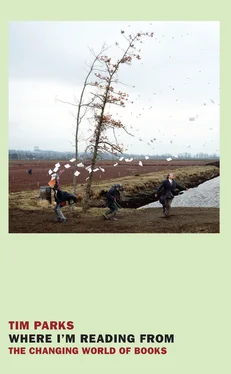If culture-specific clutter and linguistic virtuosity have become impediments, other strategies are seen positively: the deployment of highly visible tropes immediately recognizable as “literary” and “imaginative,” analogous to the wearisome lingua franca of special effects in contemporary cinema, and the foregrounding of a political sensibility that places the author among those “working for world peace.” So the overstated fantasy devices of a Rushdie or a Pamuk always go hand in hand with a certain liberal position since, as Borges once remarked, most people have so little aesthetic sense they rely on other criteria to judge the works they read.
What seems doomed to disappear, or at least to risk neglect, is the kind of work that revels in the subtle nuances of its own language and literary culture, the sort of writing that can savage or celebrate the way this or that linguistic group really lives. In the global literary market there will be no place for any Barbara Pyms or Natalia Ginzburgs. Shakespeare would have eased off the puns. A new Jane Austen can forget the Nobel.
HOW FAR IS language really able to communicate something new, something that runs contrary to my expectations? Or rather, how far will I allow it to do so?
One of the intriguing aspects of teaching translation is watching students struggle with sentences that say things they didn’t expect them to say. They are used, of course, to the process of passing from not understanding a foreign text to understanding it, that moment when a seemingly meaningless drift of words suddenly falls into place. But they also know that they often make mistakes. They must be careful. If the text says something ordinary and commonplace, there will be little doubt in their minds: “This is the kind of thing people say. It must be OK.” But if a writer should come up with some perplexing idea, or, worse still, some declaration running contrary to received wisdom or political correctness, then anxiety sets in; the words will be examined and re-examined even if their individual meaning and the overall syntax is fairly clear. In many cases, especially if the novelty is expressed subtly, students, but also practiced translators, will end up reducing the text to something more conventional.
This tic can take the form of introducing words a translator thinks should be there but aren’t. Take this fairly innocuous example: In D.H. Lawrence’s Women in Love , Ursula reflects that she’s not even tempted to get married. Her sister, Gudrun, agrees and carries on, “Isn’t it an amazing thing . . . how strong the temptation is, not to!” Lawrence comments: “They both laughed, looking at each other. In their hearts they were frightened.” A recent Italian edition of the book offers something that, translated back into English, would give, “They both burst out laughing, looking at each other. But deep in their hearts they were afraid.”
Experimenting over the years I’ve realized that if I ask a class of students to translate this into Italian, approximately half will introduce that but . It appears to be received wisdom that one doesn’t laugh if one is afraid; hence when Lawrence puts the two things together, translators feel a but is required to acknowledge the unusualness of this state of affairs. Lawrence on the other hand suggests that nothing is more common than laughing and being afraid; one laughs because afraid, in order to deny fear.
However, what is most interesting about this phenomenon is that when I quiz the students, most will admit they were unaware of having introduced the but. They actually read the text like that. Which means, one can only suppose, that a vast number of ordinary readers will be reading it like that too. Indeed, what I’m suggesting is that the kind of slippage we see in translations is probably indicative of an even greater slippage among many readers who are not of course considering the text as closely as the translator does.
This kind of automatic correction toward what the translator or reader expects can work in all kinds of ways. Later in Women in Love Lawrence describes how a sexual experience can induce a state of deep calm. Having made hurried love to Birkin in the back room of an inn, Ursula finds herself in unusually good form pouring the tea. Lawrence heaps on the significance with some unusual usages of the verb forget and the adjectives still and perfect :
She was usually nervous and uncertain at performing these public duties, such as giving tea. But today she forgot, she was at her ease, entirely forgetting to have misgivings. The tea-pot poured beautifully from a proud slender spout. Her eyes were warm with smiles as she gave him his tea. She had learned at last to be still and perfect.
The Italian translator has trouble with this, perhaps finds it embarrassing—in any event, resists. If we translate the Italian version back into English we have Ursula “entirely forgetting that she was inclined to be apprehensive”—a rather more standard statement than “forgetting to have misgivings.” But more remarkably, for the last sentence: “Finally she had learned to do it with a firm hand and perfect composure.” As if Lawrence had merely been talking about her tea-pouring abilities.
Do we as readers subconsciously make these “corrections”? How far can they go? One of the things that always surprises me when talking about Virginia Woolf’s Mrs. Dalloway is how little attention is given to the fact that this novel presents the suicide of one of its characters as a gift of individual to collective, on a par with, or at least comparable to, the party that Mrs. Dalloway throws for her well-to-do friends, or indeed the writing of the book itself. These are not fashionable or “safe” thoughts. At the crucial moment, when Septimus Warren Smith, feeling threatened by another doctor’s visit, throws himself from the window onto the railings below, he yells, “I’ll give it to you!” The Italian translation offers, “ Lo volete voi ,” which in English literally is “It’s you who want it!” or, more idiomatically, “You asked for it!” Was the translator aware she had altered the text?
It’s true that Septimus is frightened and angry, but the idea of the gift is essential to the book. Do readers, for the main, take the idea on board? To judge by how often this novel is seen as a rather flowery manifestation of soft feminism, I suspect not. Curiously, this Italian translator also has a habit of removing any unpleasantly disparaging comments Woolf makes. When Clarissa Dalloway is described as “a radiancy no doubt in some dull lives,” the translation omits the dull . In general all that is snobbish in Woolf or Clarissa is gently removed.
Interestingly, exactly the opposite occurs when Machiavelli is rendered into English. Again expectation is everything, and Machiavelli is celebrated of course for being Machiavellian . Received opinion must not shift. So when having considered the downfall of his hero and model, the ruthless Cesare Borgia, Machiavelli rather ruefully writes:
Raccolte io adunque tutte le azioni del duca, non saprei riprenderlo .
(Literally: “Having gathered then all the actions of the duke, I would not know how to reproach him.”)
The translator George Bull gives, “So having summed up all that the duke did, I cannot possibly censure him.” Here the word censure has a strong moral connotation, made stronger still by the introduction of cannot possibly , which is not there in the Italian. In line with the author’s reputation for cynicism, Bull has Machiavelli insist that he has no moral objections to anything Cesare Borgia did. Actually, Machiavelli simply says Borgia didn’t make any big mistakes. The true scandal of Machiavelli is that he never considers moral criteria at all—he doesn’t feel they are applicable to a politician fighting for survival. But it is easier for us to think of an evil Machiavelli than a lucid thinker deciding that good and evil do not come into it.
Читать дальше












